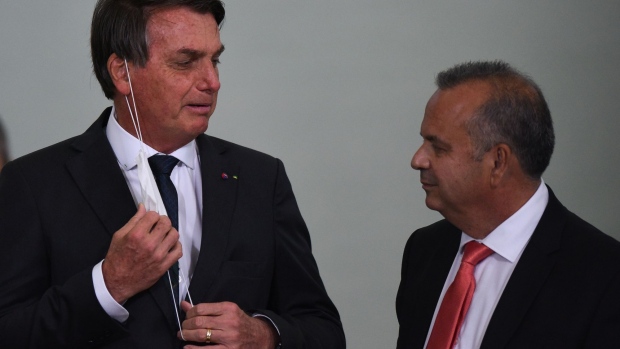Feb 1, 2023
Brazil’s Senate Leadership Race Rehashes Lula-Bolsonaro Rivalry
, Bloomberg News

(Bloomberg) -- The race for the leadership of Brazil’s Senate has turned into a re-run of last year’s presidential vote, with both Luiz Inácio Lula da Silva and Jair Bolsonaro pushing for their candidates to capture one of the country’s most influential political positions.
Lula, who won the October presidential election by a razor-thin margin, is backing current chief Rodrigo Pacheco, in a bid to keep the upper house, which leans to the right, in check. The left-wing president has made already several nods to congress, whose support he needs to pass key legislation including an overhaul to the tax system and a new fiscal anchor.
Bolsonaro, meanwhile, sees the Senate as an opportunity to maintain his political influence ahead of the next presidential election, in 2026. He’s supporting Rogério Marinho, who was part of his cabinet and was elected a lawmaker for the upper house in October.
Voting, which is scheduled for Wednesday, is secret. A simple majority of 41 votes out of 81 senators to clench the post of senate chief, and at the same time president of congress, for the next two years, yielding significant influence over legislation.
Pacheco, 46, is seen as the frontrunner. The representative of the Minas Gerais state remained mostly neutral during Bolsonaro’s administration. As the former president escalated his fight with the Supreme Court, Pacheco barred requests to impeach justices and began to distance himself from the right-wing leader, even rehearsing his own bid for the presidency, which was quickly abandoned.
Behind the scenes, Pacheco backed Lula during the presidential campaign — support that’s now being reciprocated. Although Lula has vowed to not interfere in congress elections, five of his cabinet members will temporarily step down to return to their posts as elected senators to vote for Pacheco — a common procedure when the government needs votes in congress.
In the meantime, Marinho has often criticized what he calls an “omission” by senators in regards to Supreme Court decisions, in line with Bolsonaro’s own attacks to the top court for allegedly overstepping its role.
Bolsonaro’s campaign for Marinho has been done from a distance, as he remains in Florida since late December.
“Marinho represents what Brazil wants in the senate: to rescue our values, the return of democracy, freedom, everything that we most preserve,” the former president said on Monday in a live video broadcast.
Read More: Bolsonaro Resurfaces in Orlando to Say He Won’t Leave Politics
Lower House
The lower house is also voting to pick a leader on Wednesday, with current speaker Arthur Lira widely expected to retain his position. Lira, 53, was a key ally of Bolsonaro’s during his years in office, but quickly moved to formally recognize the result of the election and work with Lula and his allies to pass legislation to allow for higher social payments to continue into 2023.
Lira leads a group of around 300 lawmakers from different parties known as “centrão,” a powerful bloc with no set ideology which tends to align with whoever is in government.
Left-wing lawmaker Chico Alencar will also run for the speaker post, but his candidacy is seen in congress only as a way to publicly position himself against Lira, who has Lula’s backing in the race.
Voting in the lower house requires 257 of the 513 congressmen be present, and the winner needs an absolute majority to win outright or a simple majority to win in a runoff.
©2023 Bloomberg L.P.







